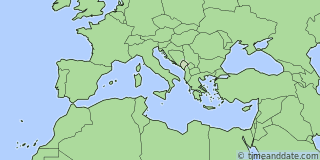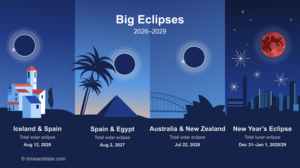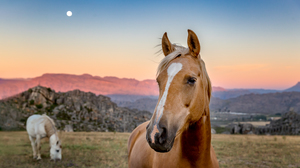| Current Time: | Sep 10, 2025 at 8:17:22 pm |
|---|---|
| Moon Direction: | ↑ 71° East |
| Moon Altitude: | 0.8° |
| Moon Distance: | 364,814 km |
| Next New Moon: | Sep 21, 2025, 9:54 pm |
| Next Full Moon: | Oct 7, 2025, 5:47 am |
| Next Moonset: | Tomorrow, 10:47 am |

Moonrise, Moonset, and Phase Calendar for 43°27'21.4"N, 19°11'31.5"E, July 2025
Scroll right to see more
| 2025 | Moonrise/Moonset | Meridian Passing | ||||||||
|---|---|---|---|---|---|---|---|---|---|---|
| Jul | Moonrise | Moonset | Moonrise | Time | Distance (km) | Illumination | ||||
| 1 | 11:34 am | ↑ (87°) | 11:58 pm | ↑ (269°) | - | 5:52 pm | (46.5°) | 397,431 | 39.0% | |
|
|
12:38 pm | ↑ (96°) | - | - | 6:32 pm | (40.5°) | 401,057 | 48.9% | ||
| 3 | - | 12:15 am | ↑ (261°) | 1:41 pm | ↑ (104°) | 7:12 pm | (34.9°) | 403,458 | 58.7% | |
| 4 | - | 12:33 am | ↑ (253°) | 2:44 pm | ↑ (111°) | 7:53 pm | (29.6°) | 404,550 | 68.1% | |
| 5 | - | 12:54 am | ↑ (246°) | 3:49 pm | ↑ (118°) | 8:37 pm | (25.1°) | 404,365 | 76.8% | |
| 6 | - | 1:17 am | ↑ (240°) | 4:55 pm | ↑ (124°) | 9:24 pm | (21.3°) | 403,019 | 84.5% | |
| 7 | - | 1:47 am | ↑ (234°) | 5:59 pm | ↑ (128°) | 10:14 pm | (18.7°) | 400,698 | 90.9% | |
| 8 | - | 2:24 am | ↑ (231°) | 7:01 pm | ↑ (131°) | 11:07 pm | (17.4°) | 397,644 | 95.8% | |
| 9 | - | 3:12 am | ↑ (229°) | 7:56 pm | ↑ (131°) | Moon does not pass the meridian on this day. | ||||
|
|
- | 4:09 am | ↑ (230°) | 8:41 pm | ↑ (128°) | 12:01 am | (17.6°) | 394,119 | 98.9% | |
| 11 | - | 5:16 am | ↑ (233°) | 9:19 pm | ↑ (124°) | 12:56 am | (19.4°) | 390,381 | 99.8% | |
| 12 | - | 6:27 am | ↑ (239°) | 9:49 pm | ↑ (117°) | 1:49 am | (22.8°) | 386,643 | 98.5% | |
| 13 | - | 7:41 am | ↑ (246°) | 10:14 pm | ↑ (109°) | 2:40 am | (27.4°) | 383,074 | 94.8% | |
| 14 | - | 8:54 am | ↑ (254°) | 10:35 pm | ↑ (101°) | 3:28 am | (33.1°) | 379,775 | 88.8% | |
| 15 | - | 10:07 am | ↑ (263°) | 10:56 pm | ↑ (92°) | 4:15 am | (39.5°) | 376,794 | 80.8% | |
| 16 | - | 11:21 am | ↑ (273°) | 11:16 pm | ↑ (83°) | 5:01 am | (46.3°) | 374,157 | 71.0% | |
| 17 | - | 12:35 pm | ↑ (282°) | 11:38 pm | ↑ (74°) | 5:48 am | (53.2°) | 371,890 | 60.0% | |
|
|
- | 1:52 pm | ↑ (291°) | - | 6:37 am | (59.8°) | 370,049 | 48.2% | ||
| 19 | 12:03 am | ↑ (65°) | 3:12 pm | ↑ (300°) | - | 7:30 am | (65.7°) | 368,729 | 36.4% | |
| 20 | 12:35 am | ↑ (58°) | 4:32 pm | ↑ (306°) | - | 8:26 am | (70.5°) | 368,079 | 25.3% | |
| 21 | 1:15 am | ↑ (52°) | 5:48 pm | ↑ (310°) | - | 9:27 am | (73.6°) | 368,271 | 15.6% | |
| 22 | 2:08 am | ↑ (49°) | 6:54 pm | ↑ (311°) | - | 10:31 am | (74.8°) | 369,446 | 7.9% | |
| 23 | 3:13 am | ↑ (50°) | 7:47 pm | ↑ (308°) | - | 11:34 am | (73.8°) | 371,685 | 2.7% | |
|
|
4:26 am | ↑ (53°) | 8:28 pm | ↑ (303°) | - | 12:33 pm | (70.9°) | 374,950 | 0.3% | |
| 25 | 5:43 am | ↑ (59°) | 8:58 pm | ↑ (296°) | - | 1:28 pm | (66.5°) | 379,082 | 0.6% | |
| 26 | 6:59 am | ↑ (67°) | 9:23 pm | ↑ (289°) | - | 2:18 pm | (61.1°) | 383,781 | 3.5% | |
| 27 | 8:10 am | ↑ (75°) | 9:43 pm | ↑ (280°) | - | 3:04 pm | (55.2°) | 388,713 | 8.6% | |
| 28 | 9:18 am | ↑ (84°) | 10:02 pm | ↑ (272°) | - | 3:46 pm | (49.0°) | 393,473 | 15.3% | |
| 29 | 10:24 am | ↑ (92°) | 10:19 pm | ↑ (264°) | - | 4:27 pm | (42.8°) | 397,694 | 23.4% | |
| 30 | 11:28 am | ↑ (101°) | 10:37 pm | ↑ (256°) | - | 5:07 pm | (37.0°) | 401,031 | 32.4% | |
| 31 | 12:31 pm | ↑ (108°) | 10:56 pm | ↑ (248°) | - | 5:48 pm | (31.5°) | 403,238 | 41.9% | |
| * All times are local time for 43°27'21.4"N, 19°11'31.5"E. Time is adjusted for DST when applicable. They take into account refraction. Dates are based on the Gregorian calendar. Illumination is calculated at lunar noon. | ||||||||||
Jan | Feb | Mar | Apr | May | Jun | Jul | Aug | Sep | Oct | Nov | Dec
Elsewhere on mungfali.galihkartiwa07.workers.dev

4 Eclipses Not to Miss 2026–2029
Some eclipses, like this month’s partial solar eclipse, can be very elusive. We’ve compiled a list of upcoming eclipses you can get to in real life.

Skywatching Tips for September 2025
What’s up in the day and night sky in September 2025, including a Blood Moon and a partial lunar eclipse.

Moon Guide for September 2025
Discover the phases of the Moon in September 2025, plus a total lunar eclipse and the New Moon partially eclipsing the Sun.

Full Moon Names
Ancient cultures gave names to the Full Moon. These names are still in use today.